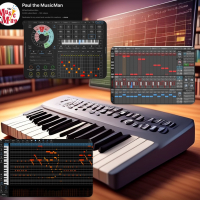Loopy Pro: Create music, your way.
What is Loopy Pro? — Loopy Pro is a powerful, flexible, and intuitive live looper, sampler, clip launcher and DAW for iPhone and iPad. At its core, it allows you to record and layer sounds in real-time to create complex musical arrangements. But it doesn’t stop there—Loopy Pro offers advanced tools to customize your workflow, build dynamic performance setups, and create a seamless connection between instruments, effects, and external gear.
Use it for live looping, sequencing, arranging, mixing, and much more. Whether you're a live performer, a producer, or just experimenting with sound, Loopy Pro helps you take control of your creative process.
Download on the App StoreLoopy Pro is your all-in-one musical toolkit. Try it for free today.



Comments
I see that nobody has responded on you question, and, I’m unsure what you’re mean…
But, if we tag/ping @klownshed or @samu perhaps they have any answer on this…
Good luck!
Thanks - Groove Templates are covered in the Logic Pro for Mac manual. You can click to create a Groove Template track, but that does not appear to be possible in Logic Pro for iPad, however the following snippet from the manual for the iPad version mentions them in the region quantization settings:
Logic Pro for iPad 2 Guide - MIDI Region Parameters
"Q-Velocity: When used with a groove template, this parameter (expressed as a percentage) determines the amount that the velocity values of quantized notes are affected by the velocity values of a template MIDI region. At a value of 0%, the notes retain their original velocity. At 100%, they adopt the velocity values of the template. Negative values alter the velocity, making the deviation from the template even greater.
Q-Length: When used with a groove template, this parameter (also expressed as a percentage value) determines how the lengths of quantized notes are affected by the equivalent note lengths (notes at the same position) of a template MIDI region. A value of 0% has no effect, while at 100%, the notes adopt the exact note lengths of the template region. Negative values alter note lengths further, resulting in a more significant deviation from the template."